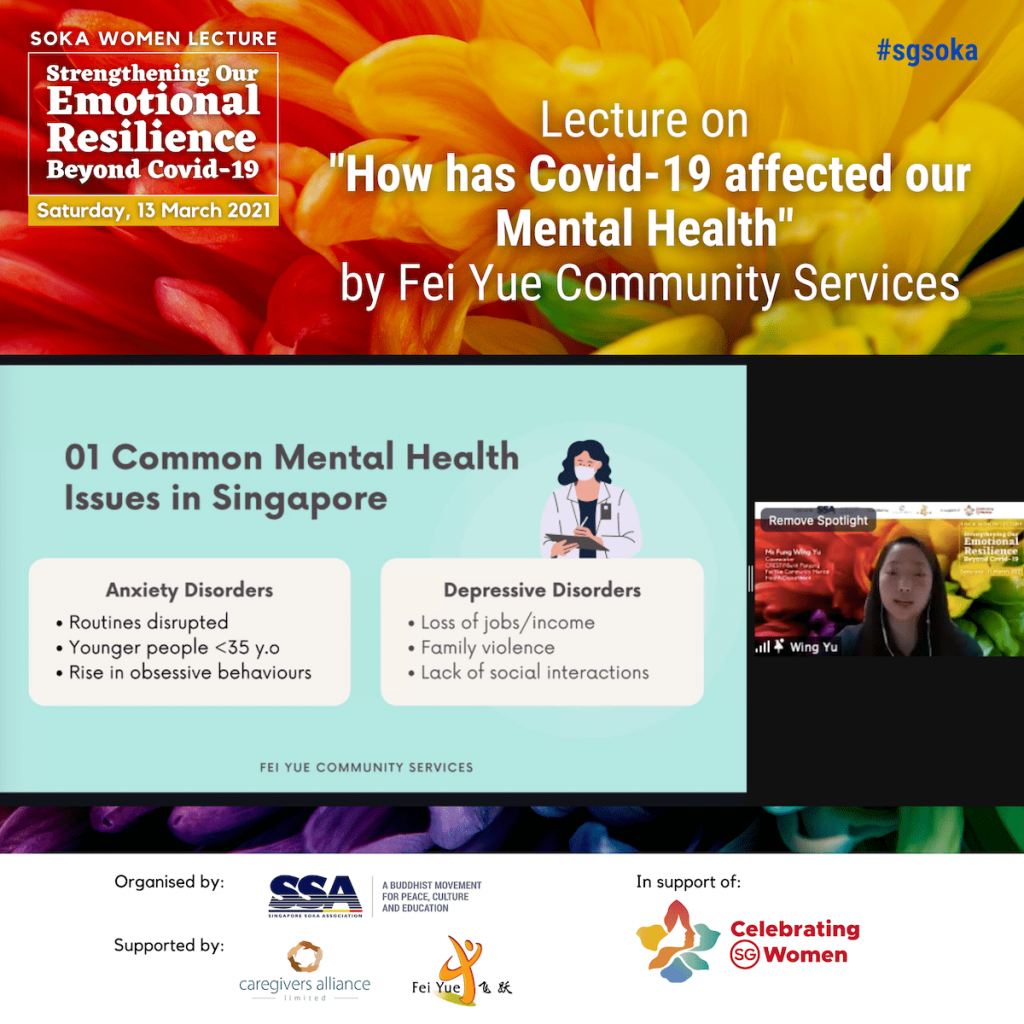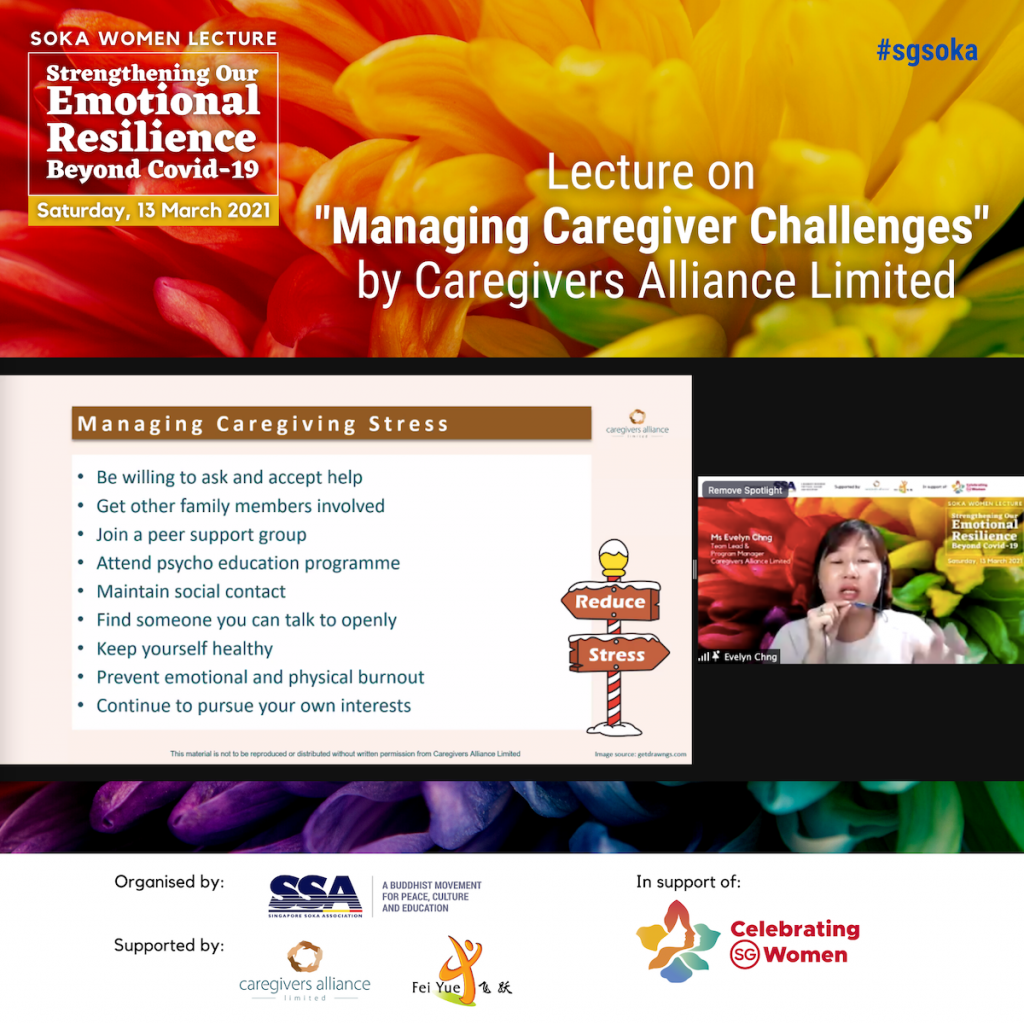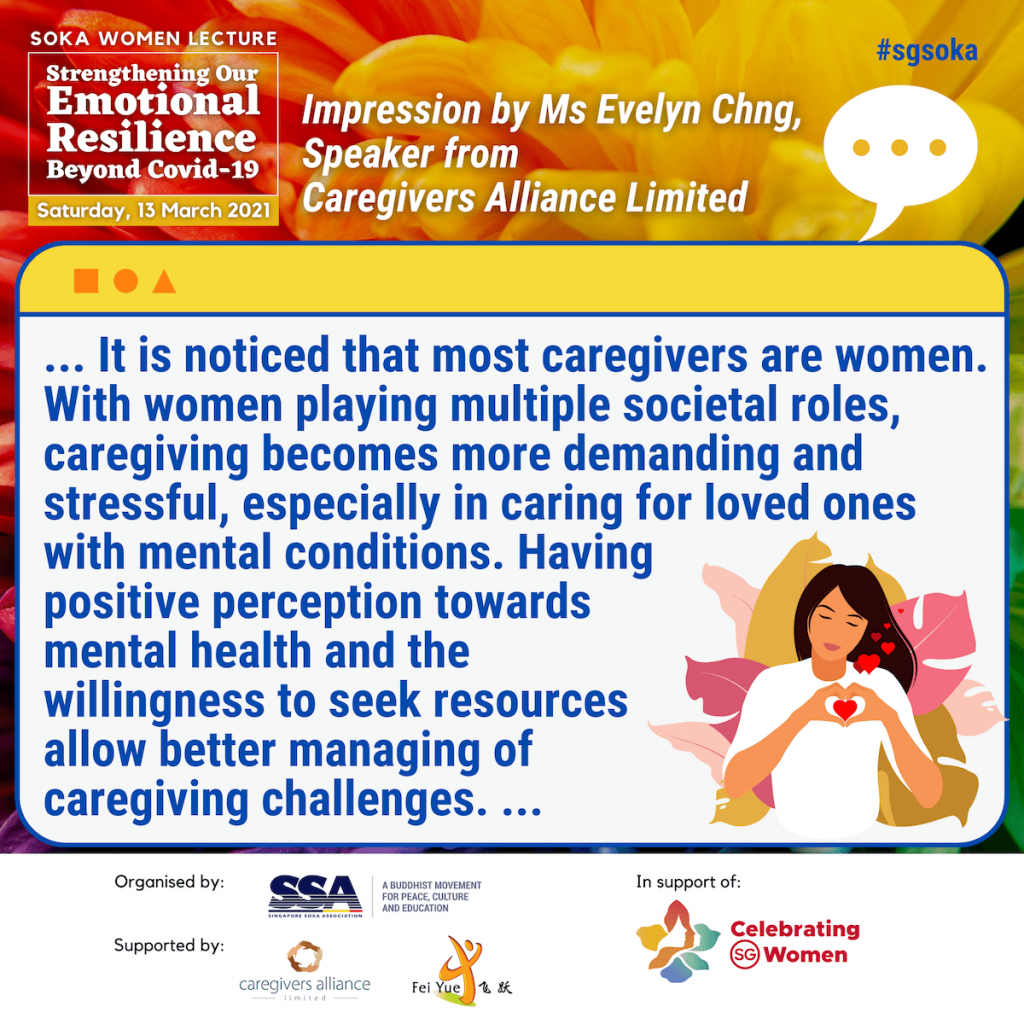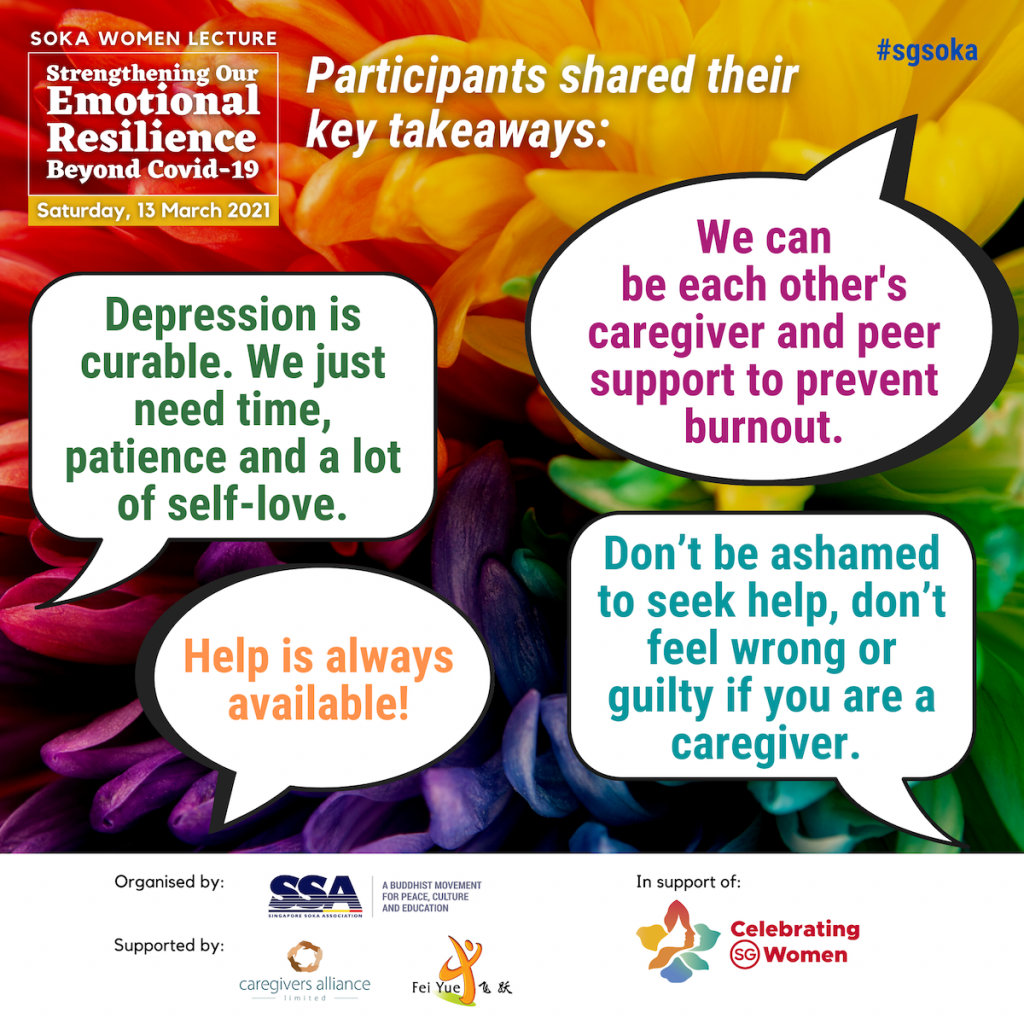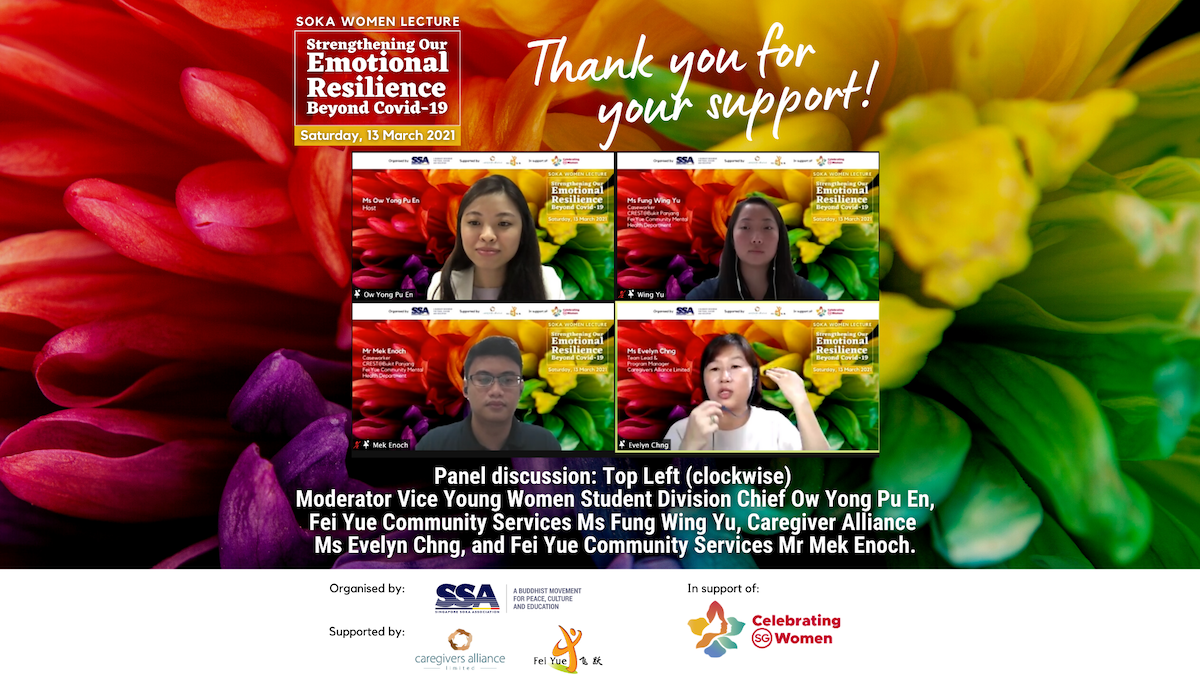
On 13 March, more than 680 people participated in the online Soka Women Lecture 2021 that discussed the theme, “Strengthening Our Emotional Resilience Beyond Covid-19”.
With the support from the Ministry of Social and Family Development under the year long movement of Celebrating Singapore Women, this event was held in collaboration with the Caregivers Alliance Limited and Fei Yue Community Services.
Professionals shared insights on issues and symptoms of mental illnesses and also useful caregiver tips. This was followed by a robust discussion on participants’ questions that further deepened everyone’s understanding on the subject matter.
Please find the Key Points from the Lecture below:
- “Managing Caregiver Challenges” by Ms Evelyn Chng, Team Lead and Program Manager, Caregivers Alliance Limited – Click here
- “How has Covid-19 affected our Mental Health?” by Ms Fung Wing Yu, Caseworker, CREST@Bukit Panjang, Fei Yue Community Mental Health Department – Click here
Impressions and narratives of the SSA Soka Women Lecture by Associate Professor Lim Tai Wei
The SSA Soka Women Zoom Lecture broadcasted from Singapore Soka Association (SSA) on 13 March 2021 Saturday 2pm to 3.30pm Singapore time was a timely and useful lecture that hit three notes simultaneously. It talked about the importance of women in Singapore’s society, including when it came to managing the pandemic and also coping with mental health issues of individuals (both mutually exclusive ways and overlapping scenarios). Perhaps, this is indicated by the fact that the speakers with professional expertise were majority women and one male volunteer. It truly showed how the non-profit organization (NPO sector) and the social enterprises of Singapore have become gender-neutral and highlighted the idea that both genders can contribute equally to managing social issues.
Secondly, it highlighted the devastation of the pandemic on Singaporean society (not an exclusive phenomenon since the rest of the world are equally impacted by it). Given that Fei Yue non-profit was a case study in the talk, it was also indicative of a thriving non-profit, volunteer sector in Singapore. The concept of a thriving social sector indicates that the power of empathy is still very much strong and alive and kicking in this sector in Singapore, something perhaps increasingly important in a world challenged by Industry 4.0 and the increasing automation of the technological world, now accentuated by the steep emergence of fallouts from the pandemic. This is very much in the spirit of the Soka Gakkai organization as a whole, active in humanitarianism and very much revving to support the United Nations’ Sustainable Development Goals (SDGs).
Certainly, Singapore itself is a world-class entity that has consistently managed these goals under the visionary and progressive leadership of an able and meticulous political leadership whose leaders have shown great statesmanship. In this aspect, let Singapore’s COVID-19 coronavirus record speak for itself as the country prepares to open up fully in December 2021. Soka Gakkai and Singapore’s society are in perfect harmonious complementarity when it comes to meeting the vaunted sustainable goals and anti-COVID-19 mitigation contributions to the region and the world. Japan is another high-integrity entity in this aspect with its environmentalism achievements and comparatively strong showing in COVID-19 measures, as it prepares to showcase humanity’s fight against the pandemic in the upcoming summer Olympic Games, a celebration of global sportspersonship.
And thirdly, it touched on a topic that is often hidden and wrapped under sensitivity and cultural politeness in the high context East Asian societies —– mental health. While one hears very often the death rates and infection rates of the COVID-19 coronavirus, the invisible existence of mental health impact is often ignored. This was not the case in the lecture which dealt with the topic square-on and how this invisible scourge affected individuals during circuit breakers (CBs), lockdowns, work from home (WFHs), study from home, confinement, marginalization from greater society and extended contact time between family members or room-mates within confined spaces. It very much coincides with the Singapore’s authorities to highlight this issue in a very difficult time so that appropriate measures can re-integrate all Singaporeans back into Singaporean society in the post-pandemic situation, in the authorities strong and illuminative no one left behind pandemic policy.
In specific case studies, the author was particularly impressed by anecdotal revelations. A senior caregiver speaker shared with the audience essence of the very concept of empathy and optimal understanding. She detailed how to handle a cognitively-challenged patient by empathizing with him. The case study was based on a patient who heard voices and the tendency for caregivers to become puzzled when the patient provided feedback that he heard voices whereas the caregiver heard nothing being in the same room at the same time. Conventionally, an untrained individual would try to explain repeatedly to the patient that there were no overhanging voices when the two were in the same room. This has the unintended effect of pushing the patient away given that empathy is missing and the patient may even reject further treatment, as the caregiver is unable to empathize with his position of hearing voices and the existence of such symptoms. Thus, her advice is not to reject his assertions but to contextualize and work with it for optimal results in caregiving.
In another narrative, it was explained how the senior caregiver went on to Nanyang Technological University (NTU) to study for a masters program as part of the progressive professional upskilling process. This indicated Singapore’s caregiving professionals’ powerful self-driven self-motivated desires to upgrade their skills for their professions, even though they were armed with the “University of Life’s” deep and intense practical experiences. This very much ties in with the Singapore authorities’ blueprint for all Singaporeans to engage in lifelong learning and constant upgrading to keep up with the prevention of obsolescence of skills and to keep relevance with changing social trends as well as updating scientific methodologies and pedagogies in professional skills. The fact that the speakers shared their case studies and bio details with the audiences indicate open contextualization of their backgrounds to help audiences understand where the speakers are coming from.
Thank you SSA for a productive, value-added, insightful and educational lecture.
(Tai Wei LIM is an Associate Professor at Soka University (SUJ), Adjunct Senior Research Fellow at the National University of Singapore East Asian Institute (NUS EAI), and Visiting Associate Professor at Waseda University where he teaches summer courses. In SUJ, he teaches sustainable business, in which gender parity is an issue in focus. In NUS EAI, he researches on East Asian affairs and is a contemporary China watcher/sinologist. He is also a frequent media commentator on East Asian affairs.)

